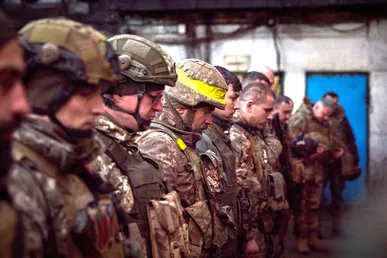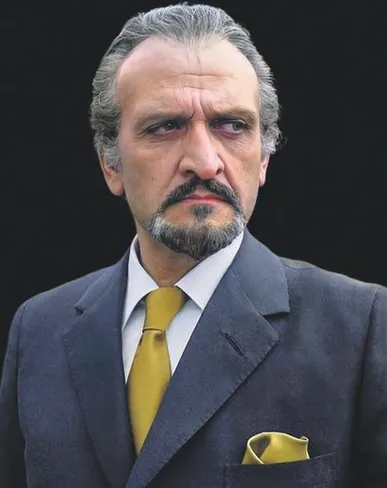
Ukraine: Five reflections on the war

Jonathan Frais
What do you make of the conflict in Ukraine? Its presence feels like the "new normal". Should we be bored, interested, concerned or even frightened? Let me offer five reflections.
- What the Bible says
Jesus said there will be “wars and rumours of wars” (Mark 13v7), and spring is the time “when kings go off to war” (1 Samuel 11v1). Battles are so well known that we urge one another, “Fight the good fight of faith” (1 Timothy 6v12). The relative peace of the last 70 years has been unusual in historical terms but Jesus told us, “Love your neighbour as yourself” (Mark 12v31) and that can apply to a country in need.
We know that Jesus, “Prince of Peace” (Isaiah 9v6), says “Blessed are the peacemakers” (Matthew 5v9) and “he himself is our peace”, reconciling enemies “through the cross” (Ephesians 2v14, 16) – whether Jew, Gentile or “Scythian” (Ukrainian; Colossians 3v11). As a gospel people, “God is our refuge and strength” even when familiar borders and landmarks move (“mountains fall into the heart of the sea”; Psalm 46).
- What the news reports
On 24 February 2022, as martial law was imposed to keep men for fighting, many women and children fled. One million went through the Polish border in the first week. (The numbers soon surpassed the estimated two million Hebrews under Moses leaving Egypt.)
Since then, standing with Ukraine is regarded as one of the few agreed causes in Western political life. But people differ on the detail.
Some perspectives are too narrow, claiming that the war is just nations scrapping over land (ignoring daily Russian war crimes of targeting civilians, torturing prisoners, and gassing soldiers). Other angles are too wide, claiming that millions have died (although Ukraine has seen 70,000 soldiers die with 400,000 injured; while Russian forces have four times the death toll and double the injuries). And some approaches are simply wrong, such as Russia saying that Ukraine started the war, or that Russia cannot be beaten (when it lost to Japan in 1905, was defeated by Germany in 1914-18, and was pushed out of Afghanistan in 1989), or that tyrants are secure (tell that to Syria’s Assad).
- What war teaches us
Soldiers are our protectors. They are the extension of the authority of parents, teachers and police officers. In their encounters with fighters, neither John the Baptist nor Jesus nor Peter told them to resign (Luke 3v14; 7v1-10; Acts 10). But alliances for self-interest are inevitable. In time of war, the enemy of my enemy is my friend and so we helped Stalin fight Nazi Germany. On one side, Russia has soldiers from North Korea, technology from China, and has bought weapons from Iran and raised money by cheap oil sales to India. On the other side, there is safety. Countries have welcomed Ukraine’s refugees (a million each in Poland and Germany; 370,000 in Czechia [or Czech Republic]; 190,000 in the UK). But NATO is divided and timid, offering support short of the ability to defeat the aggressor (or, as the Ukrainians say, Make Russia Small Again).
- How we should pray
Pray for strength. War is exhausting. In Kyiv, some residents no longer go to the shelters when the sirens blare nightly.
Pray for protection. Across Ukraine, schools devote class time to explaining the dangers of playing with bomb debris but tragedies still happen.
Pray for courage. Zelensky has defied all predictions of his and Ukraine’s demise as his drones take bombs vast distances and keep sea lanes clear for grain exports. He travels widely to rally support (you leave Kyiv by 12-hour train for Poland). Meanwhile, Western leaders meet often but tread carefully, preferring not to rile Putin by spending the frozen assets of his oligarchs, or by intercepting his shadow fleet of sanctions-busting ships, or by placing troops in Ukraine itself.
Pray for resistance fighters behind enemy lines. Russification of the occupied territories has backfired with Kyiv loyalists able to use their new Russian passports to move freely across the Russian Federation.
Pray for truth. Putin does not want peace. His war economy is aimed at restoring the Soviet Union, as his writings make clear (hence the USSR flag at the prisoner exchange in May and the USSR ["CCCP"] slogan worn by Foreign Minister Lavrov as he arrived for the meeting with President Trump in Alaska).
Pray for Russia. May the regime’s leaders repent of their brutality, the media recover its voice, mourning families be told the truth, and prisoners of conscience be freed.
Pray for churches, particularly in Ukraine. May each one be renewed by Scripture as a community of hope and love for the traumatised and grieving.
Pray for Christian organisations helping Ukraine, such as the Bible Society, Samaritan’s Purse, and the Slavic Gospel Association.
- How we should act
Thank your MP for taking the issue seriously. (Remind them that we had common enemies in the Vikings and first had diplomatic contact when Oliver Cromwell corresponded with the Cossack hetman, Bohdan Khmelnytskyi.
Ask hosts of Ukrainian guests where they get advice on negotiating British culture (benefits, NHS, school, housing) and make sure local pastors have contact details.
Offer your church hall to Ukrainians for their parties.
Seek to include a Ukrainian flag at Remembrance Sunday.
Ask teachers you know not to push Ukrainian children to take GCSE Russian as an easy exam; they see it as the language of murderers. (But do ask headteachers to request that exam boards offer Ukrainian as a GCSE.)
Ask a youth group to research what the United Nations means by "abducted children".
Preach on what the Orthodox Church – strong in both Russia and Ukraine - gains and loses by its focus on “participating in the divine nature” (2 Peter 1v4).
Count among your “good deeds” (1 Peter 2v12) support of Ambulances for Ukraine and personally encourage anyone who visits the country.
Think about donating a car. (On the frontline, Ukrainian soldiers prefer civilian vehicles and British ones are prized because Russian snipers assume the driver is on the other side.) Or consider the Ukraine Investment Framework.
Be concerned. But don’t be frightened.

Screwtape: ‘Ludicrous games, unfulfilled promises’
An email from C.S. Lewis’ fictitious devil Screwtape has unexpectedly fallen into the hands of en.
My dear Wormwood,